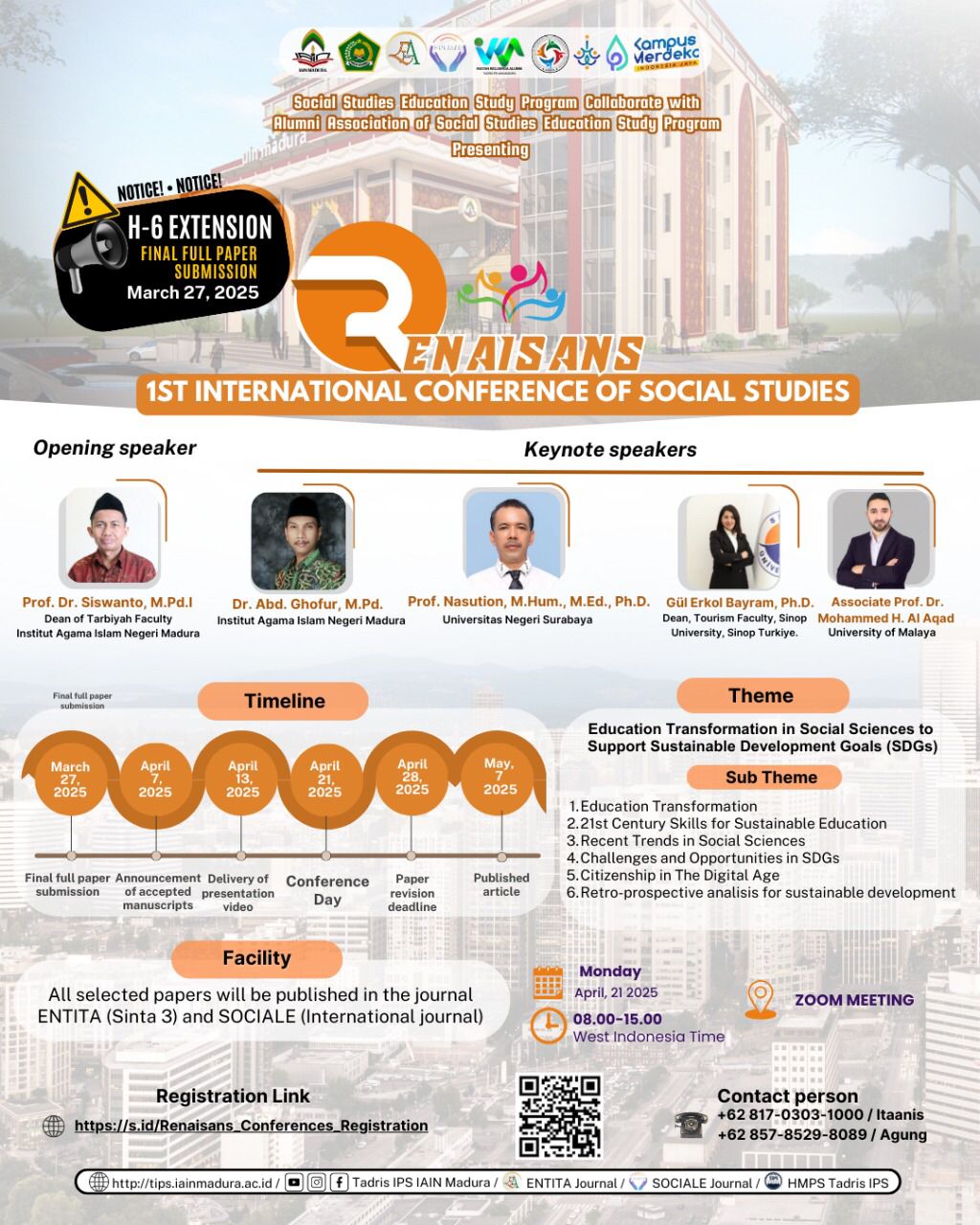Konstruksi Kemiskinan dalam Perspektif Suku Madura
 Abstract views: 3
,
Abstract views: 3
,
 PDF (Bahasa Indonesia) downloads: 3
PDF (Bahasa Indonesia) downloads: 3
Abstract
This study aims to understand the perception of Madurese people towards cultural and structural poverty in Plakpak Pegantenan Village, Pamekasan. Cultural poverty refers to cultural factors that influence poverty, such as values, norms, and habits that hinder economic progress. Meanwhile, structural poverty is caused by systemic factors, such as government policies, access to education, and employment opportunities. Through qualitative methods with empirical research types, this study collected data from in-depth interviews and participant observations. The results of the study indicate that Madurese people in Plakpak Pegantenan Village have a complex understanding of poverty, which includes both cultural and structural aspects. These findings are expected to provide insight for policy makers in designing poverty alleviation programs that are more effective and in accordance with the local context. the existence of cultural poverty, can be seen from the symptoms and social conditions that are visible in poor culture, namely apathy towards the development of science, an attitude of resignation to fate, wasteful in shopping and consumptive and there is dependence on the environment, quick to give up (despair) when facing problems, there is a feeling of uselessness, a feeling of temperament or like to be emotional when facing problems, geographically located in remote areas or far from metropolitan cities and the emergence of thoughts of helplessness in starting a more decent life process.
Downloads
References
Arikunto, S. (2006). Prosedur Penelitian Suatu Pendekatan Praktis. Jakarta: Rineka Cipta.
Desiree Zuraida, Jufrina Rizal. (1993). Masyarakat dan manusia dalam pembangunan: pokok-pokok pikiran Selo Soemardjan. Jakarta: Pustaka Sinar Harapan.
Gunawan, I. (2013). Metode Penelitian Kualitatif Teori dan Praktik. Jakarta: PT Bumi Aksara.
Helaluddin. (2018). Mengenal Lebih Dekat dengan Pendekatan Fenomenologi: Sebuah Penelitian Kualitatif. Jakarta: scholar.google.co.id.
Hendrik. (2023, Agustus Selasa). Kemiskinan bagi orang madura. (s. Romadhon, Interviewer)
Moleong, L. J. (2017). Metode Penelitian Kualitatif. Bandung: PT. Remaja Rosdakarya.
Neuman, L. (2017). Metodologi Penelitian Sosial: Pendekatan Kualitatif dan Kuantitatif, edisi ke 7, cet. Ke 3 . Jakarta: Indeks .
Nugrahani, F. (2014). Metode Penelitian Kualitatif dalam Penelitian Pendidikan Bahasa. Surakarta: Layanan Koleksi Digital.
Palikhah, N. (2016). Konsep kemiskinan kultural. alhadharah, 11-27.
Plakpak, T. P. (2023). Profil Desa Plakpak. Pamekasan: Pemerintah Desa Plakpak.
Poloma, M. M. (2004). Sosiologi Kontemporer. Jakarta: PT RajaGrafindo.
Riskiyah. (2023, Agustus Selasa). Kemiskinan bagi orang Madura. (S. Romadhon, Interviewer)
Ritzer, G. (2002). Sosiologi ilmu pengetahuan berparadigma ganda. Jakarta : PT. Raja Grafindo Persada.
Rozaki, A. (2004). Menabur Kharisma Menuai Kuasa, Kiprah Kiai dan Blater Sebagai Rezim Kembar di Madura. Yogyakarta: Pustaka Marwa.
Supriatna, T. (1997). BIROKRASI : pemberdayaan dan pengentasan kemiskinan. Bandung: Humaniora Utama Press.
Syafie Maarif, d. (2007). Islam, Good Governance dan Pengentasan Kemiskinan. Jakarta: Maarif Institut for culture and humanity.
Umar Sidiq, Moh. Miftachul Choiri. (2019). Metode Penelitian Kualitatif di Bidang Pendidikan. Ponorogo: CV. Nata Karya.
Wafi, A. (2023, Agustus Minggu). Abd. Wafi, Ketua BPD Plakpak, tanggal 20 Agustus 2023. (S. Romadhon, Interviewer)
Emilia, Emi, Nurfitri H., and Lungguh A.B. (2018). “An Analysis of Cohesion of Exposition Texts: An Indonesian Context.” Indonesian Journal of Applied Linguistics 7, no. 3 (January 31, 2018): 515. https://doi.org/10.17509/ijal.v7i3.9791.
Copyright (c) 2025 Entita: Jurnal Pendidikan Ilmu Pengetahuan Sosial dan Ilmu-Ilmu Sosial

This work is licensed under a Creative Commons Attribution-NonCommercial 4.0 International License.
ENTITA: Jurnal Pendidikan Ilmu Pengetahuan Sosial dan Ilmu-Ilmu Sosial operates an Open Access policy under a Creative Commons Non-Commercial 4.0 International license. Authors who publish with this journal agree to the following terms:
- The copyright of the received article once accepted for publication shall be assigned to the journal as the publisher with licensed under a

- Journal is able to enter into separate, additional contractual arrangements for the non-exclusive distribution of the journal's published version of the work (e.g., post it to an institutional repository or publish it in a book), with an acknowledgement of its initial publication in this journal.
- Journal is permitted and encouraged to post their work online (e.g., in institutional repositories or on their website) prior to and during the submission process, as it can lead to productive exchanges, as well as earlier and greater citation of published work (see The Effect of Open Access).
- Here is Copyright Transfer Form that author can download and send to OJS during submission.

















